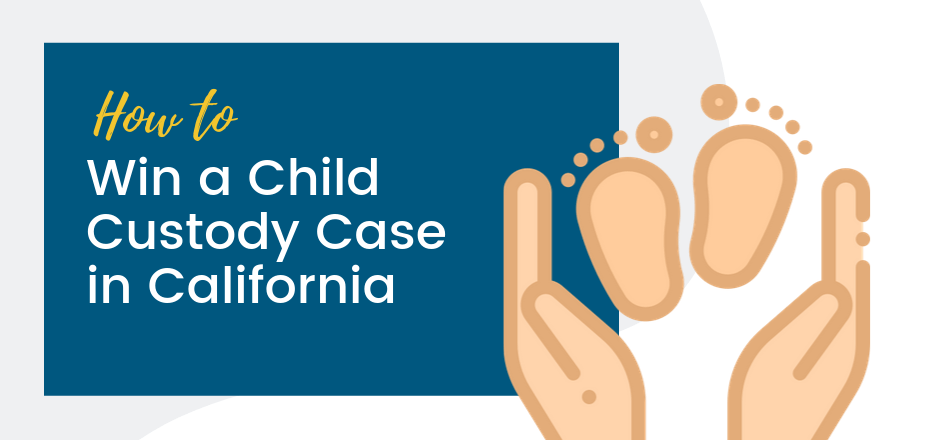How to Win a Child Custody Case in California
If you’re going through a divorce and have children, you may be interested in knowing how to win a child custody case in California. In order to win custody of your child or children, it’s important for you to understand the process and follow the steps we have outlined below.

How to Win a Child Custody Case in California
In the state of California, divorce is the most common cause for parents to become involved in child custody cases. The majority of these cases pass smoothly without any issues because parents already have a mutual understanding. This is of course ideal and should always be the goal.
Even when parents split amicably, having a court order that sets out each person’s rights and responsibilities to the child can help parents work together in the best interests of their child. This document also outlines financial responsibilities (e.g., child support) and access rights (e.g., visitation times) to eliminate questions or arguments about who is involved and when.
Related: 5 Types of Child Custody
The sad truth is that a significant number of cases aren’t amicable at all. Parents may fight for custody over neglect, abuse, addiction problems, the threat of abduction, alienation, incarceration, or some other harmful influence. Or, a guardian might put the child at risk in some other way (e.g., being unable to provide safe living conditions, such as food or shelter). Sometimes, Child Protective Services (CPS) becomes involved, forcing parents to fight against the state.
Regardless of the reasons why you are seeking custody arrangements, your first and most important step should always be to contact a family law attorney with experience in child custody matters. Still, there is much you can do on your own at home to improve your chances of success.
Here’s how to win a child custody case in California…
Maintain Good Records
Whether you are the parent defending your right to custody or the parent asking for custody, you can and should document everything that occurs with relation to the case. Be as descriptive as you possibly can, even if the occurrence doesn’t seem all that important or relevant at the time.
Keep a notebook on you. Record when you pick your children up and how often you see them and whether or not you argue with your ex or the parent during the exchange. Note when and if the other parent doesn’t show up for visitation, if they are late, or if they run late bringing your child back. Your goal is to be able to tell the court the truth about every experience involving your child.
Also keep copies of emails, voicemails, witness accounts, doctor’s assessments, psychological evaluations, proof of income, last year’s tax return, and any documents you have from prior cases (e.g., court orders for child support). These files will make it easier for both the court and your lawyer to understand the real situation.
Related: 10 Ways to Prepare for your Child Custody Case
Maintain Adequate Living Conditions for the Child
If you have been accused of being neglectful or keeping your child in unsafe living conditions, now is the time to eliminate any problems. It doesn’t matter if the person or entity seeking custody lied or misconstrued the situation – it only matters whether or not you can prove the child is safe when you get to court.
The law defines a safe and secure home as being stable, clean, and free from potential risks to the child’s safety. Children must have a bedroom with adequate bedroom furnishings, bedding, and clothing. You must be able to prove your children have access to food, too – empty cupboards can be considered a form of neglect.
Don’t Leave Your Kids Alone
It’s harder than ever for the average parent to work and take care of their children without hiring a nanny or sitter. Don’t allow yourself to be tempted to leave your children alone (or even under the care of a pre-teen sitter) for any length of time. Despite the fact that there is no minimum age for children to remain alone in the state of California, so much can go wrong. A single unintentional incident might end up working against you in court.
Instead, hire a reliable adult babysitter with references and first aid/safety training every time. The extra cost may seem steep now, but it will pay off later by keeping your child, and your reputation, safe.
Be Faultless on Social Media
Most parents don’t even consider the implications of social media posts on child custody cases. The truth is that lawyers and the courts can, and often will, use what you post to prove or disprove claims.
A flippant comment about wanting to “kill your ex” may be said in jest, but it is still effectively a death threat. That picture of you and your friends drinking at a local bar may be five years old, but it can also be used to prove you are an alcoholic. The message you sent your ex when you first broke up calling them every name in the book for cheating on you can be used to prove you are verbally abusive.
Even if you have your profile locked down, you should behave as if the courts themselves are watching at all times. The truth is that someone who is communicating with the other party is likely seeing your posts.
Connect with a Counselor
It may be advantageous for you and your children to see a therapist or counselor for the duration of your case. Not only will this help everyone move forward in a more positive manner, but a counselor can also testify as a witness.
Creating a support network also tells the judge in your case that you are actively trying to go above and beyond to be a better parent
Remain Connected to Your Children
No matter how far the distance or what challenges exist, do your best to remain connected to your children and active in their lives.
If you have visitation, be sure that you make every visitation meeting. Volunteer at their school, go to all of their recitals, and just generally be present. This shows the judge that you are motivated to parent your child and that you are willing to do whatever it takes to care for them.
Make Good Parenting Choices
When you do spend time with your kids, make good parenting choices at all times.
Don’t do or allow anything that might otherwise be misconstrued as unsafe, unnecessarily risky, or otherwise problematic – such as allowing sleepovers during the week or drinking beer at home. Don’t let kids play with dangerous tools or toys, even under your supervision, and don’t allow teens to have romantic partners over for the night.
Now is not the time to test the waters.
Conclusion
Your choices and any associated discipline for breaking the rules should always be in your child’s best interests. By keeping things above-board at all times, you prevent the other party from accusing you of anything untoward, including abuse, neglect, or a lack of interest in your child.
If you need help finding a lawyer who handles child custody cases, contact the Attorney Referral Service to get started.
Are you in search for a certified attorney to represent you?
Let us help you find one today!


